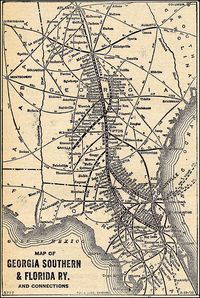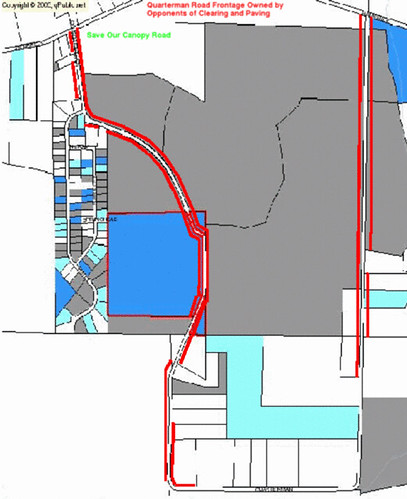“It’s just waitin’ in the wind.”
-jsq
“It’s just waitin’ in the wind.”
-jsq
 Gretchen found this one, too (think I can get her to blog?).
Judi Gerber writes about
Why Saving Farmland Is So Important:
Gretchen found this one, too (think I can get her to blog?).
Judi Gerber writes about
Why Saving Farmland Is So Important:
…without local farms, there’s no local food, or, as the American Farmland Trust (AFT) puts it: “No Farms, No Food.”.
And it’s not even just food:
Farmland is green space, even though most people don’t think of it that way. It is a significant contributor to environmental quality. As AFT states, “Farm and ranch lands provide food and cover for wildlife, help control flooding, protect wetlands and watersheds, and maintain air quality. They can absorb and filter wastewater and provide groundwater recharge. New energy crops even have the potential to replace fossil fuels.”
And there’s more:
Farmland provides fiscal stability to local governments and boosts the economy. It does this by contributing to a community’s infrastructure and helps a local economy through sales, job creation, and support services or businesses.There are some plans afoot about agrotourism in Lowndes County.One of the most unique of these support services is tourism, or more specifically, agri-tourism. There are plenty of places that people visit to see rural scenery or to enjoy the food or drink of a specific region including the wineries in California’s Napa Valley, or popular farm stays like those found in Italy, and increasingly, here in the United States.
-jsq
 Gretchen noted this VDT Editorial for 12 July 2010:
What We Think: Thankful for our farmers:
Gretchen noted this VDT Editorial for 12 July 2010:
What We Think: Thankful for our farmers:
Here in South Georgia, we are blessed with an abundance of farmer’s markets, both large and small, that enable us all to have access to fresh fruits and vegetables at low prices. Families, restaurants and schools all benefit from the local farms and markets year round, not just during the summer months.Here’s one of those farmers’ markets, in Hahira.Fresh fruits and vegetables are healthy, inexpensive, and an essential part of any diet. Take advantage of nature’s bounty that surrounds us and visit the markets. Take your family to one of the peach sheds and spend an afternoon picking your own and enjoying fresh ice cream.
Be thankful that the farmers are still willing to work hard on the land and be thankful you live in an area that encourages farmers and supports agriculture.
-jsq
 Some of you may remember my aunt, Elsie Quarterman, born in Valdosta,
played basketball for Hahira High School:
Some of you may remember my aunt, Elsie Quarterman, born in Valdosta,
played basketball for Hahira High School:
At 99 years old she won’t be outwalking everybody like she used to, but she will be there. Road trip to Lebanon, Tennessee? Y’all come!Cedars of Lebanon State Park will host its annual Elsie Quarterman Cedar Glade Wildflower Festival April 30 – May 1. Held in partnership with The Center for Cedar Glade Studies of Middle Tennessee State University, this event will offer visitors an opportunity to learn more about the area through seminars, guided nature walks, exhibits, guest speakers and naturalist displays. All events are free and open to the public.
“We are honored to be hosting this 33rd annual event and excited about the roster of experts on hand during this two-day festival,” said Park Ranger and Naturalist Wayne Ingram. “We have numerous activities and educational opportunities planned for all ages and encourage everyone to join us – rain or shine.”
Dr. Elsie Quarterman was professor Emeritus of Vanderbilt University and pioneered cedar glade research in the early 1950s. Coupled with her extensive research at this site, Dr. Quarterman has been an advocate for natural area protection throughout her distinguished career. Her efforts helped Tennessee in 1971 become one of the first states to pass legislation to protect natural areas in the U.S.
Echinacea tennesseensis, the Tennessee coneflower, thought to be extinct until Elsie rediscovered it: Continue reading
In his comments, LaHood tried hard not to criticize Georgia policy makers directly. “I’m not going to pretend to tell Georgia what to do,” he said repeatedly.Ain’t that the truth.But rather than criticize the lack of planning and support for high-speed rail in Georgia, he offered examples of regions elsewhere that “get it.” “The Northeast (high-speed rail) corridor has its act together,” LaHood said. “The Midwest corridor has its act together. The governors there have set aside their own egos and their own ambitions” to work together on bringing high-speed rail to those regions.
LaHood made no mention of the stark contrast to the Southeast, where our governors are too busy posturing to discuss resolution of the ongoing water wars, let alone high-speed rail.
The best part is in a comment:
You see the state legislature wants to control the tax revenues from metro Atlanta so they can spend them in Hahira, Rome, Valdosta, etc., etc. Antwhere but metro Atlanta.Ah, Atlanta! Just more important than anywhere else!
 You know, if Atlanta cooperated in creating a rail plan for the entire state,
such as for example the long-established rail corridor from Chattanooga
through Atlanta, Macon, Tifton, Hahira, and Valdosta to Jacksonville and
Orlando, we might actually get rail in Georgia.
It doesn’t have to all be high speed.
If I could take a regular passenger train to Atlanta, I sure would,
instead of having to drive or squeeze into an ASA toothpaste tube.
You know, if Atlanta cooperated in creating a rail plan for the entire state,
such as for example the long-established rail corridor from Chattanooga
through Atlanta, Macon, Tifton, Hahira, and Valdosta to Jacksonville and
Orlando, we might actually get rail in Georgia.
It doesn’t have to all be high speed.
If I could take a regular passenger train to Atlanta, I sure would,
instead of having to drive or squeeze into an ASA toothpaste tube.
By the way, Ray LaHood has a blog.
Given the financial state of the Georgia Department of Transportation (GDOT), it would seem only prudent not to be spending on unnecssary projects. GDOT considered layoffs back in October to stem a 200 million dollar deficit, but
Instead, board members chose to cut $52 million in state aid used to help cities and counties build and maintain roads and bridges, leaving two programs that are highly popular with local officials without a penny for the rest of this fiscal year.Spending $6M on old US 41 would indeed seem most imprudent at this time.— Georgia DOT avoids layoffs, Atlanta Business Chronicle – by Dave Williams Staff Writer, Tuesday, October 7, 2008
To: Richard C. Lee, District 2
|
From: John S. Quarterman
|
Thank you for meeting with us Friday. That was a good beginning to a conversation, much like I had hoped we would have after you attended our neighborhood meeting of June 5 in which we requested further options and my letter of August 7 in which I also requested further options regarding Quarterman Road. Now we’re talking!
 I understand that there has been some confusion as to who wants to
do what with Quarterman Road. This is why we have clarified neighborhood
opinion with the petition of 26 October showing that a majority of households
on the road and the owners of a majority of the road frontage
do not want the road paved,
at least not using the current plan the county is pursuing of clearing
a 60 foot right of way and tearing down the tree canopy.
I understand that there has been some confusion as to who wants to
do what with Quarterman Road. This is why we have clarified neighborhood
opinion with the petition of 26 October showing that a majority of households
on the road and the owners of a majority of the road frontage
do not want the road paved,
at least not using the current plan the county is pursuing of clearing
a 60 foot right of way and tearing down the tree canopy.
Apparently there has also been some confusion as to what the state requires the county to do. I hear that some time in the past the county was planning to use state money to improve Quarterman Road. If so, I see how that money could have come with requirements from the state. That would explain why the current county paving plan, which was originally drawn up many years ago, looks more like a state highway than a rural local county road. However, as I am sure you are aware, SPLOST VI is a local tax, not state money, so there are no such requirements along with it. I confirmed this with the District Engineer with GDOT. He tells me that the state makes no requirements on the county as to what to do with Quarterman Road, which the state classifies as functional class 9, a rural local road. Continue reading
Be sure to wear your Shriner hat or other Muslim garb.